There is no greater threat to the unity of the church than legalism.
These are strong words, but history, tradition, experience, and Scripture reveal that where legalism spreads, disunity prospers.
Thankfully, God has provided an antidote to legalism through the free gift of eternal life which is received by grace along through faith alone in Christ alone.
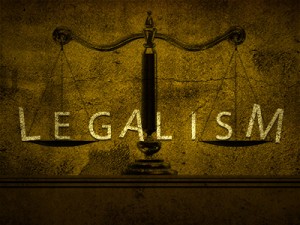 Just as legalism breeds disunity, love and unity flourish where grace and faith multiply. The more we emphasize grace and faith, the greater our unity will be. For this reason—and simply for the sake of the truth—a strong stance on the simplicity and freeness of eternal life by grace alone through faith alone is essential.
Just as legalism breeds disunity, love and unity flourish where grace and faith multiply. The more we emphasize grace and faith, the greater our unity will be. For this reason—and simply for the sake of the truth—a strong stance on the simplicity and freeness of eternal life by grace alone through faith alone is essential.
To see this, it is important first of all to know what legalism is.
Legalism Defined
Lots of people have heard about legalism, but few know what it is. Here is a basic definition of legalism:
Legalism is when people use the law of God in an attempt to gain favor with God.
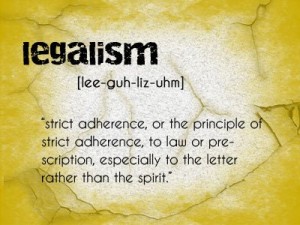 At it’s core, legalism believes that God is angry with humanity, and that the way to make God like us again is to obey His laws. And if everybody could just obey God’s laws all at the same time, then God might love us and be happy with us again, and blessings from heaven will flow down upon us once more.
At it’s core, legalism believes that God is angry with humanity, and that the way to make God like us again is to obey His laws. And if everybody could just obey God’s laws all at the same time, then God might love us and be happy with us again, and blessings from heaven will flow down upon us once more.
So at it’s core, legalism has some seriously faulty views about God, about sin, about the law, and about how people can get into a good relationship with God. All of these faulty views are what makes legalism so dangerous and divisive.
Legalism is Dangerous
Legalism is dangerous because it begins with the premise that God is mad at us and He gave us His law so that we could get back into His good favor.
But if Jesus tells us anything about God, it is that He is NOT angry with us. To the contrary, He loves us deeply and longs for nothing more than to reconcile us to Himself (2 Cor 5:19). It is not He who needs to be reconciled to us, but we to Him. In other words, He is not the one who has abandoned us; we have abandoned Him. It is not He who left us, but we who left Him.
By sending Jesus to this earth, God bridged the divide that we placed between Him and us. Out of His great love for us, He has come to where we are, because He knew that we would never (and could never) come to Him.
But the basic premise of legalism contradicts all this. Legalism teaches that we have offended God so deeply that He is angry with us… He even hates us… and so we must try to please and appease God by doing things He likes so that maybe, somehow, hopefully, God will love us once more.
Not only is such legalistic theology terribly wrong, it becomes terribly divisive.
Legalism is Divisive
Legalism is divisive because as soon as one person thinks that they are starting to obey God’s law and make God happy with us again, that person begins to think that the reason God is still angry with the world is not because of his or her sin, but because of everyone else’s. So if everyone else would just clean up their life and start obeying God, then God will start to love us again. As soon as legalists begin to make some headway in their own life in the “Obedience to the Law” department, they set themselves up as a manager in the department, and try to get everybody else to follow the rules as well.
But this isn’t the most dangerous or divisive element to legalism. What makes legalism so divisive is that nobody actually thinks they are legalistic.
Though there are countless Christians who are legalistic, you will never meet anyone who claims to be a legalist. This is what makes legalism so sinister. It sucks the life out of Christians who believe they stand for the truth of Scripture and the Gospel. Legalism run madly toward death, all the while thinking they are pursuing life.
 Since nobody believes that they are legalistic, everybody believes they have a healthy balance between law and grace, between faith and good works. A legalist then, is anyone who places a greater emphasis on law and good works than you do. On the opposite end of the spectrum, we criticize those who take grace too far. Those people are licentious, we think. They place too much emphasis on grace and in so doing, give people license to sin.
Since nobody believes that they are legalistic, everybody believes they have a healthy balance between law and grace, between faith and good works. A legalist then, is anyone who places a greater emphasis on law and good works than you do. On the opposite end of the spectrum, we criticize those who take grace too far. Those people are licentious, we think. They place too much emphasis on grace and in so doing, give people license to sin.
In this way, since only “other” people are legalists, and each of us is only trying to get people to obey God and live within the principles of the Kingdom of God, the hidden legalist in each of us (myself included!) becomes judgmental, critical, and divisive in our treatment of others. Legalism tears Christians apart because it sets up laws and rules as the means by which we maintain relationships between one another and between ourselves and God. And part of the divisive nature of legalism is that nobody can agree on the rules that must be observed. Everybody has different rules and regulations that must be maintained in order to fellowship with someone else.
Legalism’s Antidote
So what is the cure? What is the fix? What is the antidote to legalism?
Since legalism is so sinister, and since it is so hard to define, one might think that combating legalism is not worth the effort. Some might be tempted to think that it is not legalism that divides Christians, but the struggle against legalism that causes the problems. If some people are legalistic and others are licentious, wouldn’t it be better, for the sake of unity, to just throw up our hands, shrug our shoulders, and say “Live and let live”?
No, I don’t think so. Why not? Because Scripture seems intent on combating legalism wherever it is found. If legalism is one of the greatest threats to Christian unity, and legalism is found in every one of us, and Christian unity is something we should strive for, then legalism is worth fighting against.
In fact, it could be argued that much of the New Testament was written to combat legalism. Jesus fought against the legalism of the Pharisees and Sadducees. The apostles fought against legalism in Acts (e.g., Acts 15), and the Apostle Paul fought against legalism in most of his letters. So if they fought against legalism, we should to.
 How? Most people try to combat legalism with a different form of legalism. I have seen arguments break out between a behavioral legalist and a doctrinal legalist. The first person thinks we make God happy by what we do, while the second person argues that we make God happy by what we believe.
How? Most people try to combat legalism with a different form of legalism. I have seen arguments break out between a behavioral legalist and a doctrinal legalist. The first person thinks we make God happy by what we do, while the second person argues that we make God happy by what we believe.
I think it is time to back away from all of these rules and regulations, and look at how the Bible seems to combat legalism. And how is that? By emphasizing grace as much as possible.
One reason legalism is so divisive is that Christians seem so intent on putting limits and restrictions on grace. The moment we set limits to God’s boundless grace is the moment we wrap ourselves in the dark bonds of legalism, but the moment grace is unleashed and unchained, legalism shrivels up and dies.
So what is the antidote to legalism? Grace. Radical grace.
Do your best to never limit or restrict grace in any way. Let grace be extended to point of shamefulness. Let us live indiscriminate, shocking, outrageous, scandalous, senseless, irrational, unfair, irreligious, ridiculous, absurd, offensive, infinite, free grace.
Let us live life as a contest to see who can be the most gracious, loving, kind, and forgiving, and teach others to do the same. If we are going to follow the example of Jesus (and of God), we must extend grace to the point that people accuse us being friends to tax-collectors and sinners, to the point that they complain of how we allow people to get away with anything, of how we liberally shower blessings upon friends and enemies alike, and how we even show love and mercy upon those who wish to do us harm.
Such outrageous grace is what God shows us, and how we can live toward others. This kind of grace is the antidote to the legalism in all of us.
This post was part of the November 2018 Synchroblog.
Here is the list of other writers and authors who contributed to this month’s Synchroblog. Go read them all to see what others think about church unity.
- Heathens and Heretics – Glenn Hager
- What have we Become? – Rocky Glenn
- Unified Through Life – Jordan Hathcock
- How Can Churches Exemplify Unity in a Divided Country? – Mike Edwards
- Practicing Unity – Tim Nichols
- Christian Unity – Joseph A.





 But what does this have to do with voting? Voting is not an oath of fealty. Voting is not a stamp of approval on everything the person you vote for has said and done, or will say and do. Voting is not a promise to obey, support, and defend everything this person says or does.
But what does this have to do with voting? Voting is not an oath of fealty. Voting is not a stamp of approval on everything the person you vote for has said and done, or will say and do. Voting is not a promise to obey, support, and defend everything this person says or does.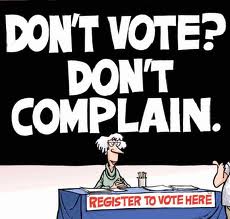 Voting is a way to make your voice heard. And if you don’t want to make your voice heard through voting, then you should also not make your voice heard after the voting is over. When you vote, according to the values and principles of your only sovereign, Jesus Christ, this is what gives you the subsequent right to raise your voice in prophetic warning about the poor decisions that the leaders are making, whether or not you voted for them.
Voting is a way to make your voice heard. And if you don’t want to make your voice heard through voting, then you should also not make your voice heard after the voting is over. When you vote, according to the values and principles of your only sovereign, Jesus Christ, this is what gives you the subsequent right to raise your voice in prophetic warning about the poor decisions that the leaders are making, whether or not you voted for them.
 If you really listen to what all candidates say, this is exactly the sorts of things they all promise.
If you really listen to what all candidates say, this is exactly the sorts of things they all promise.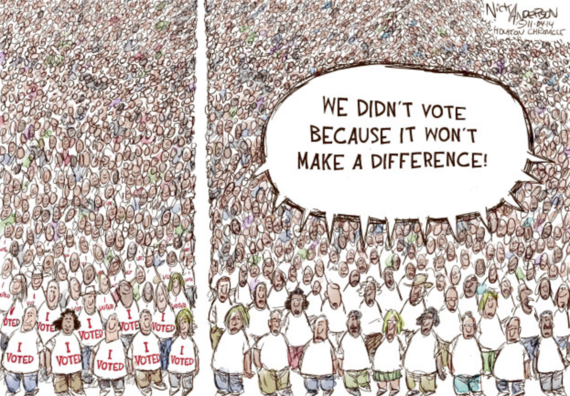

 (Note: I include Greg Boyd’s “Divine Withdrawal” view in this category. He argues that God finally got fed up with the evil of mankind, and so He withdrew His divine hand of protection that was holding back the destructive floodwaters, thereby allowing them to destroy humanity. In this view, God didn’t do the destroying Himself; He simply stepped back to let the destroyer have its way with humanity. In a personal conversation with Greg Boyd, I related to him the following video clip, and he agreed that for the most part, it represents his position.)
(Note: I include Greg Boyd’s “Divine Withdrawal” view in this category. He argues that God finally got fed up with the evil of mankind, and so He withdrew His divine hand of protection that was holding back the destructive floodwaters, thereby allowing them to destroy humanity. In this view, God didn’t do the destroying Himself; He simply stepped back to let the destroyer have its way with humanity. In a personal conversation with Greg Boyd, I related to him the following video clip, and he agreed that for the most part, it represents his position.) Is this just a divine example of the bad parenting advice “Do as I say; not as I do?”
Is this just a divine example of the bad parenting advice “Do as I say; not as I do?” And when we look to Jesus, and specifically the most violent aspect of the life of Jesus, His crucifixion, and we carefully see what is being done to Jesus on the cross, we discover something surprising.
And when we look to Jesus, and specifically the most violent aspect of the life of Jesus, His crucifixion, and we carefully see what is being done to Jesus on the cross, we discover something surprising.
 Looking at our face in the mirror of Genesis 6–8, we must ward ourselves against the common human practice of condemning others when bad things happen to them. We must stop saying, “Well, he lost his job and got cancer, so God must be punishing him for some secret sin.” (Remember Job?) Instead, when bad things happen to people, we must, like Jesus, enter into their hellish pain and sorrow, and help them or love them in in any way we can.
Looking at our face in the mirror of Genesis 6–8, we must ward ourselves against the common human practice of condemning others when bad things happen to them. We must stop saying, “Well, he lost his job and got cancer, so God must be punishing him for some secret sin.” (Remember Job?) Instead, when bad things happen to people, we must, like Jesus, enter into their hellish pain and sorrow, and help them or love them in in any way we can.
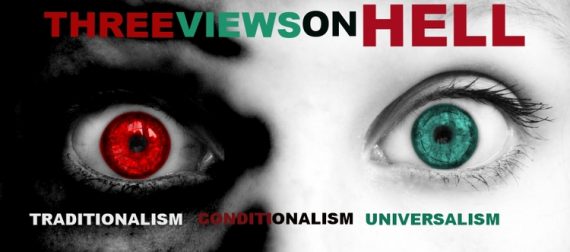
 However, the Annihilationist also agrees with the Universalist that it would be monstrous for God to torture people for all eternity. The biblical texts which seem to imply an eternal existence in fire are instead understood as texts that describe an eternal destruction so that those who undergo it simply cease to exist.
However, the Annihilationist also agrees with the Universalist that it would be monstrous for God to torture people for all eternity. The biblical texts which seem to imply an eternal existence in fire are instead understood as texts that describe an eternal destruction so that those who undergo it simply cease to exist.

 Let us look briefly at Just War theory, and how it is defined. Following this, I will suggest an alternative method to accomplishing God’s will in this world.
Let us look briefly at Just War theory, and how it is defined. Following this, I will suggest an alternative method to accomplishing God’s will in this world. There is no such thing as a true pacifist. Pacifists want to do no harm, to engage in no violence, to kill nothing and hurt nothing. Many pacifists are vegetarians, or even vegans, because they do not want to participate in the killing of animals. And yet few pacifists have difficulty with taking antibiotic medicine or spraying their counter with Lysol to ward off germs and bacteria. But germs and bacteria are living microorganisms. So it is okay to kill them, but not larger organisms? At what point does killing become wrong?
There is no such thing as a true pacifist. Pacifists want to do no harm, to engage in no violence, to kill nothing and hurt nothing. Many pacifists are vegetarians, or even vegans, because they do not want to participate in the killing of animals. And yet few pacifists have difficulty with taking antibiotic medicine or spraying their counter with Lysol to ward off germs and bacteria. But germs and bacteria are living microorganisms. So it is okay to kill them, but not larger organisms? At what point does killing become wrong?
 The
The  We change the world by showing it a different and better way to peace than the way it knows, which is the way of war and bloodshed.
We change the world by showing it a different and better way to peace than the way it knows, which is the way of war and bloodshed.